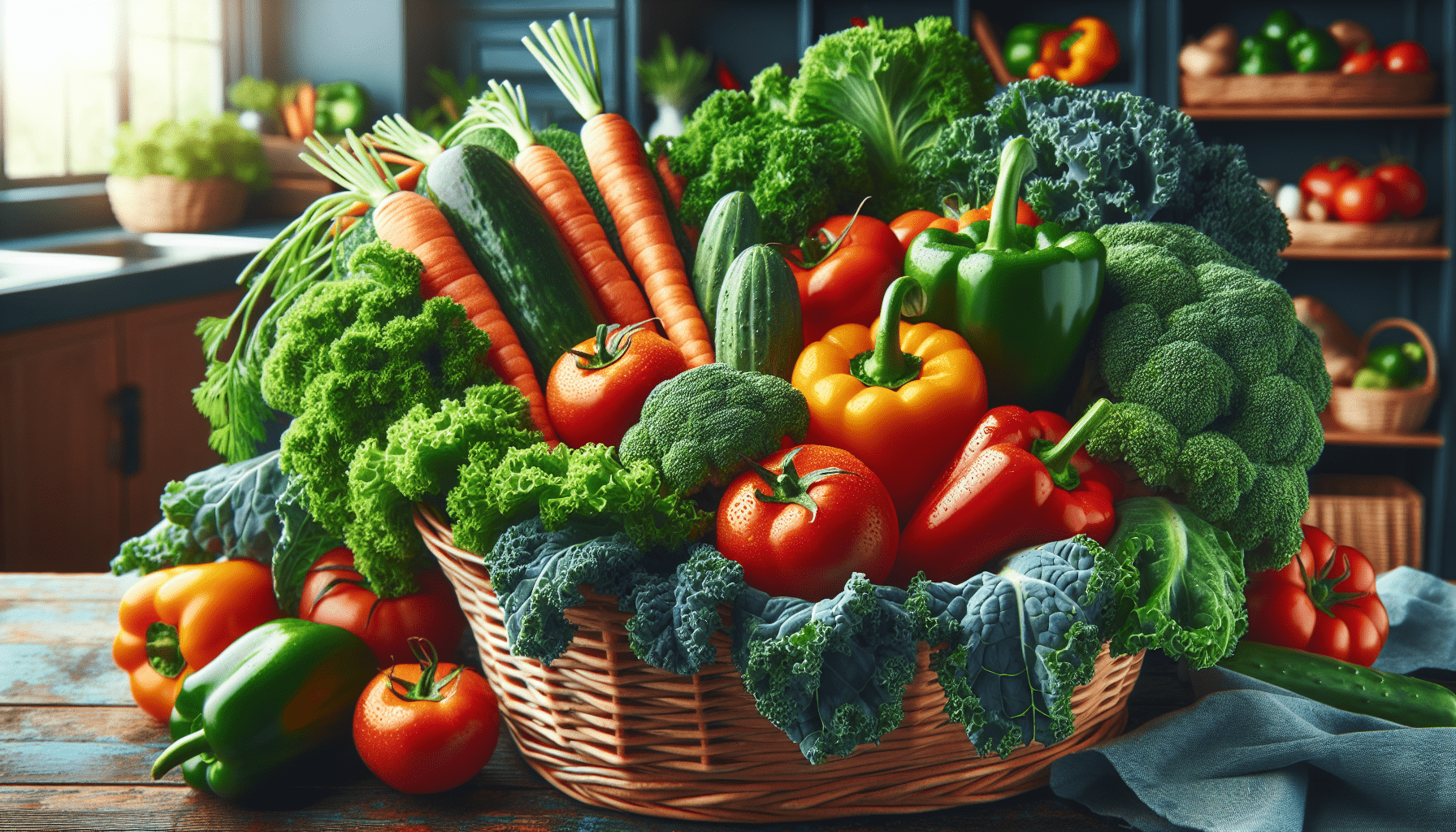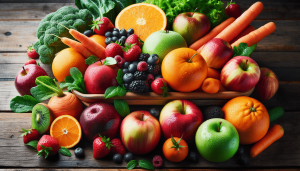Let’s dive into the fascinating world of organic food and its potential benefits for weight loss. As more and more of us become health-conscious, exploring whether eating organic can actually help shed those extra pounds becomes an intriguing question. In this journey together, we’ll look at how organic food impacts our bodies, influences our weight management strategies, and contributes to our overall well-being. Can organic food help with weight loss? This is a question we often hear, especially as more of us seek healthier and more sustainable lifestyles. In this article, we’ll explore the relationship between organic food and weight loss to see if going organic can indeed trim our waists.
What is Organic Food?
Organic food refers to products that are grown and processed following specific guidelines established by organic farming standards. This means:
- No Synthetic Pesticides or Fertilizers: Organic farms avoid harmful chemicals, opting instead for natural alternatives.
- Non-GMO: Organic foods are free from genetically modified organisms.
- Natural Growth: Animals are raised without antibiotics or synthetic growth hormones.
It’s clear from the outset that organic food prioritizes natural growth patterns and environmental sustainability. But how might this impact our weight loss efforts?
Nutrient Density
Richer in Nutrients
Organic foods often contain higher levels of certain nutrients compared to their conventional counterparts. This nutrient density can help us feel fuller for longer and, in theory, reduce our overall intake of food.
Comparing Nutrients
Let’s take a look at how organic and conventional foods compare in terms of nutrient content:
| Nutrient | Organic Food (Avg) | Conventional Food (Avg) |
|---|---|---|
| Vitamin C | 21% Higher | Lower |
| Antioxidants | 30% Higher | Lower |
| Omega-3 Fatty Acids | 50% Higher | Lower |
| Pesticide Residues | Negligible | Present |
Satiety and Nutrient Absorption
Higher nutrient density can help with satiety, the feeling of fullness. When we’re well-nourished, our bodies are less likely to crave additional, often calorie-dense, foods.

Lower Toxin Intake
Pesticides and Weight Gain
Conventional foods are often laden with synthetic pesticides and chemicals that can affect our metabolism. These toxins may contribute to weight gain and difficulty in shedding extra pounds.
The Role of Organic Foods
Organic foods minimize or eliminate exposure to these harmful substances, potentially creating a healthier internal environment for weight loss.
Hormone Balance
Synthetic Hormones in Conventional Foods
Conventional animal products may contain synthetic hormones that can disrupt our natural hormone balance. Hormonal imbalances can lead to issues with weight management, particularly around the stomach area.
Organic Meats and Dairy
Opting for organic meats and dairy products can lead to a more balanced hormonal state, helping us manage our weight more effectively.

Better for the Gut
Gut Health and Weight
Gut health plays a significant role in our overall weight. A healthy gut can improve our digestion and metabolism, making weight loss easier.
Organic Food and Probiotics
Organic foods, particularly fermented ones like yogurt and sauerkraut, are often richer in probiotics, which can aid in maintaining a healthy gut flora.
Avoiding Additives
The Problem with Additives
Conventional foods can contain a myriad of artificial additives, preservatives, and colors that may lead to weight gain. Some of these additives can interfere with our body’s natural hunger cues, making us overeat.
Clean Eating with Organic Foods
Organic foods usually have fewer additives, which can help us maintain a better control over what we eat and how we feel after eating.

Environmental Impact
Sustainability and Personal Health
Our personal health is closely linked to the health of our environment. By choosing organic foods, we’re not only nourishing our bodies but also supporting farming practices that are better for the planet.
Long-Term Benefits
This sustainable cycle can lead to long-term health benefits that may indirectly support weight loss, such as reduced exposure to environmental toxins and better quality of air and water.
More Conscious Eating
Mindful Eating
When we choose organic foods, we’re often more mindful of what we put into our bodies. This mindfulness can extend to portion control and better food choices overall.
Quality over Quantity
By focusing on the quality of our foods, we may naturally gravitate towards more nutrient-dense options that support weight loss, rather than calorie-dense but nutrient-poor foods.

Potential Pitfalls to Consider
Higher Costs
One of the most commonly cited drawbacks of organic food is its higher cost. This can be a barrier for many people trying to eat healthily on a budget. However, considering the long-term health benefits, it might be worth the investment.
Accessibility
Organic foods are not as widely available as conventional foods. This can make it more challenging to maintain an entirely organic diet.
Understanding Labels
Organic labels can sometimes be confusing. It’s essential to understand what various certifications mean and ensure you’re buying genuinely organic products.
Combining Organic Foods with Other Weight Loss Strategies
Balanced Diet
Organic foods should be a part of a balanced diet. Combining organic fruits, vegetables, meats, and dairy with whole grains and healthy fats can create a well-rounded approach to nutrition and weight loss.
Regular Exercise
Exercise is essential for weight loss, irrespective of the type of food we consume. Pairing regular physical activity with an organic diet can yield better results.
Adequate Hydration
Staying well-hydrated is crucial for weight management. Drinking enough water can help us feel full and flush out toxins, complementing the benefits of an organic diet.

Personal Stories and Anecdotal Evidence
Real-Life Success Stories
Numerous individuals have reported significant weight loss after switching to an organic diet. Many of them cite higher energy levels, better digestion, and fewer cravings as key factors.
Anecdotal Evidence
While personal stories are compelling, it’s essential to remember that anecdotal evidence is not scientific proof. However, these stories can be inspiring and provide practical insights.
Scientific Studies and Research
What Does the Research Say?
While there is still much to learn, some studies have shown that organic foods can support weight loss efforts.
Meta-Analyses
Several meta-analyses have compared organic and conventional foods, finding that organic foods often contain more nutrients and fewer pesticides. These factors can play a role in supporting overall health and weight loss.
Conclusion
So, can organic food help with weight loss? While it’s not a magic bullet, there are several compelling reasons to believe that it can support our weight loss efforts. From higher nutrient density to fewer toxins and additives, organic foods offer numerous benefits that can help us on our journey to a healthier weight. Coupled with other healthy habits like exercise and hydration, choosing organic foods might be a step in the right direction.
In the broader scope of maintaining a healthy diet and lifestyle, organic foods appear to be a beneficial choice. While they can be more expensive and less accessible, the long-term health benefits they provide make them worth considering for anyone serious about weight loss and overall well-being.



